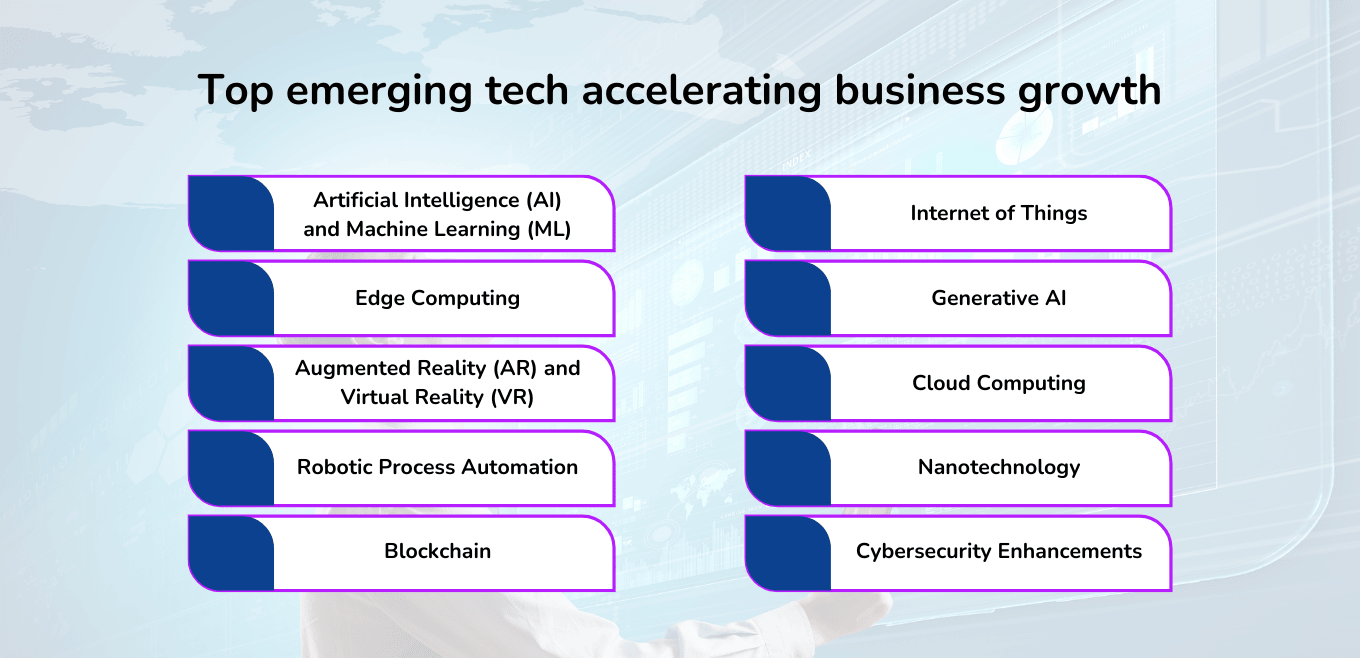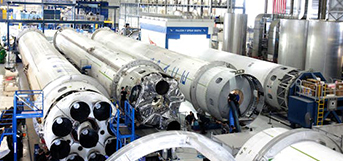According to research, 76% of companies saw reduced costs due to technology transformations.
Emerging tech continues to influence how we live, work, and interact with each other in a world where digital solutions are the norm. Numerous technical advancements benefit us by boosting productivity, making necessary services more accessible, and generally simplifying our lives. But they often push us to alter our routines and behaviors. So, are we ready for the next step?
Artificial intelligence (AI), Robotics, the Internet of Things (IoT), Blockchain, Cybersecurity, and Big Data are examples of emerging technologies that have the potential to make products and services widely available, especially for individuals who currently face challenges in using them. In addition to improving our quality of life and enabling us to make more environmentally friendly decisions, technological innovation makes it simpler to stay connected with our loved ones over long distances.
What are the benefits of emerging tech?
Emerging tech presents new chances to develop creative company strategies and new market value. They frequently enable better client outcomes through innovative and enhanced methods.
The advantages of emerging technologies may vary depending on the particular technology and how businesses use it. However, some typical advantages are as follows:
Creativity and Innovation
Emerging technologies frequently enable new ways of thinking, problem-solving, and creating,, which leads to creative solutions and unique products and services.
Productivity and Efficiency
Emerging technologies can significantly enhance productivity and efficiency across a range of sectors by automating tasks, streamlining processes, and enhancing communication.
Competitive Edge
Businesses can gain a competitive edge by early adoption of emerging technologies or by utilizing them creatively.
Improved Customer Experience
Certain emerging technologies enhance customer experience by enabling individualized services, real-time support, and smooth interactions across multiple channels.
Cost Savings
Certain technologies help reduce costs by increasing resource efficiency and automating processes.
Environmental Benefits
Emerging technologies and software can reduce environmental impact by encouraging sustainable practices or minimizing waste through more efficient processes.
Top emerging tech accelerating business growth
Every year, companies create countless solutions to speed up their processes, regardless of the industry they belong to, demonstrating that technological innovation has no bounds. These are the top emerging tech solutions for 2025 that can significantly improve various corporate operations.

1. Artificial Intelligence (AI) and Machine Learning (ML)
AI and ML are at the forefront of emerging tech breakthroughs and have taken over many commercial activities. These technologies quickly analyze vast amounts of data, aid in well-informed decision-making, and enhance operational efficiency. By offering round-the-clock customer service, it significantly improves the client experience. In addition to doing predictive analytics, machine learning algorithms optimize supply chain management. These characteristics assist businesses in seeing new market opportunities and incorporating them into their operations.
AI and ML are key factors behind modern business models like the sharing economy and on-demand services. By offering quick delivery services, they are revolutionizing established sectors like retail, healthcare, and finance. By introducing these technologies into a venture, one can see their setup grow in no time.
2. Edge Computing
Edge computing is rapidly gaining traction in the commercial sector due to its numerous advantages. Instead of transferring data to a central data center or cloud, edge computing involves processing and analyzing data closer to the data source. This reduces latency, allowing for faster data processing, analysis, and transfer while reducing the risk of data leaks. It helps businesses collect and analyze data in real-time enabling them to make more informed decisions quickly. This has had a profound impact on the manufacturing sector, where optimizing production processes for maximum efficiency is crucial, as downtime can be costly.
Businesses greatly benefit from edge computing since it significantly reduces their dependency on centralized data centers and cloud providers. These centralized solutions can be expensive while at the risk of cyberattacks. Businesses can minimize data breaches and maintain significant control over their data by processing and evaluating data locally.
3. Augmented Reality (AR) and Virtual Reality (VR)
For over a decade, VR and AR have been useful technology tools. AR focuses on improving the existing user environment, whereas VR immerses users in a simulated setting. Since they greatly aid in staff training, both of these technologies have a big influence on businesses. Virtual Reality allows employees to participate in simulations of different real-life situations.
This enables people to acquire information and real-world experience risk-free. This is especially beneficial in sectors where safety can be a major concern, such as manufacturing, healthcare, and aviation. Since AR reduces training duration and streamlines the process, it can be an effective tool for real-time instruction and on-the-job training.
AR and VR are also transforming how businesses market their products and services. Thanks to these customers can now enjoy an immersive experience that was previously unattainable. Businesses can achieve higher engagement and improved sales conversion rates by putting these technologies into practice.
4. Robotic Process Automation
RPA is a cutting-edge technology that uses software robots, or “bots,” to automate repetitive and rule-based processes. It is well known to reduce costs while increasing accuracy, productivity, and efficiency. Back-office management benefits significantly from it as tasks like Data entry, report production, and invoice processing can be easily automated. This allows staff members to work on more complex and high-value projects. Unlike humans, the bots adhere to preset protocols and guidelines that, for the most part, yield error-free outcomes. This reduces data processing inconsistencies, which has enormous advantages, especially in sectors like healthcare and finance.
By automating repetitive tasks, RPA provides businesses with a competitive edge. This helps them maintain an advantage over the rest and enhances agility to adapt to changes.
5. Blockchain
Blockchain technology is revolutionizing the way we think about transactions and data security. It is a decentralized ledger that guarantees immutability, security, and transparency across multiple industries. Blockchain reduces expenses and enhances efficiency by allowing peer-to-peer transactions without intermediaries. It’s being used in supply chain management, healthcare, and other fields, not only cryptocurrency. Blockchain is creating a new era of digital trust and privacy by opening the door for trustless agreements.
6. Internet of Things
The Internet of Things (IoT) is fusing the digital and physical worlds by linking commonplace devices to the Internet to gather and exchange data. Efficiency is increased, jobs are automated, and user behavior is analyzed thanks to this network of linked devices. This makes it possible to make better decisions in sectors like smart homes, healthcare, and agriculture. IoT holds the potential to transform how we interact with our environment, promising a future where seamless device integration and communication enhance operational productivity and quality of life.
7. Generative AI
Generative artificial intelligence (GenAI) is revolutionizing creativity and problem-solving across industries due to its remarkable versatility. It enables businesses to automate tasks ranging from text generation to image creation freeing up time to focus on innovation. It allows businesses to scale up personalized customer experiences, which improves satisfaction and engagement. It is a powerful tool for businesses to lead their industries since it creates new opportunities for the development of products and services.
Join Us at the Forefront of Innovation
Connect with our experts to tap into the potential of emerging tech for your business.
8. Cloud Computing
Cloud computing is revolutionizing the way businesses grow and deliver their services by offering unparalleled flexibility and efficiency. It removes the need for substantial on-premises infrastructure by enabling businesses to access vast storage and processing power via the Internet. This technology greatly lowers operating expenses, enhances communication across global teams, and allows for quick scalability to meet demand. Businesses can position themselves as leaders in the digital age by using cloud computing to accelerate innovation and deliver top-notch services and products to the market with accuracy and agility.
9. Nanotechnology
Nanotechnology involves the engineering of functional systems at the molecular level, advancing several disciplines, including materials science, electronics, and medicine. By modifying matter at the atomic or molecular level, Nanotechnology makes it possible to create materials with better qualities, such as greater strength, reduced weight, and increased chemical reactivity. It can be used to build stronger yet lighter materials, more efficient solar panels, and more advanced medicine delivery systems. Nanotechnology has the potential to lead to groundbreaking discoveries and provide answers to some of the most difficult issues that humanity has ever confronted.
10. Cybersecurity Enhancements
Businesses now prioritize cybersecurity improvements due to the increased reliance on digital technologies. As cyber threats are getting more sophisticated, it is crucial for organizations to protect their systems and data. Potential breaches can be avoided by putting robust cybersecurity measures in place, such as firewalls, intrusion detection systems, and frequent security audits.
Establishing a culture of security within an organization requires educating employees on cybersecurity best practices. Employees should receive training on safe internet practices, password management, and phishing attacks. Businesses can drastically reduce the risk of human error—which is frequently the primary cause of security breaches—by encouraging awareness and attention.
Your tech-driven future is in your hands
Exploring these ten cutting-edge technologies will show how they will change competition and drive innovation. Every technology, from artificial intelligence to nanotechnology, can transform business processes and open new markets. The true strength lies in their integrated application, which boosts each other’s skills and gives organizations a distinct competitive edge. In addition to promoting growth, this technological synergy ushers in a new era of business flexibility and vision. If you want to lead in the business of the future, you must embrace these changes.
Struggling to Keep Up with Rapid Technological Change?
People10 provides the best solutions to help you leverage emerging tech for business growth, efficiency, and innovation.
Author
Mohit Juneja leverages his extensive expertise in architecture and solution design to drive complex application delivery. His passion for continuous learning keeps him at the forefront of technology advancements.



